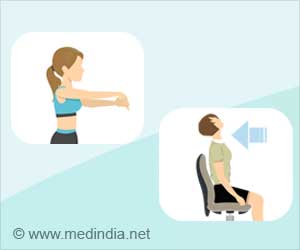- Radiotherapy related fatigue is a detrimental side effect of cancer therapy affecting the quality of life of almost all cancer survivors
- In a recent study, it was observed that women faced less post treatment fatigue and better quality of life even with little exercise as long as they stuck to it //
Assessment and management of cancer-related fatigue in adults
Go to source). Breast cancer is one of the most prevalent cancers in the world affecting more than 2.3 million women worldwide. While exercise has been established as one of the factors to prevent breast cancer, its effect post cancer therapy is not well studied.
A recent study included 89 women with 43 completing a home-based 12-week program, consisting of a weekly exercise regime of one to two resistance training sessions and a total of 30-40 minutes of aerobic exercise (2✔ ✔Trusted Source
The effects of home-based exercise therapy for breast cancer-related fatigue induced by radical radiotherapy
Go to source).
The remaining patients were a control group who did not participate in the exercise program.
Exercise Helps in Recovery of Fatigue Post Cancer Treatment
Researchers found patients who exercised recovered from cancer-related fatigue quicker during and after radiotherapy compared to the control group and saw a significant increase in health-related quality of life post radiotherapy.No adverse effects from the exercise were reported.
Researchers said that home-based resistance and aerobic exercise during radiotherapy is safe, feasible, and effective in accelerating recovery from cancer-related fatigue and improving health-related quality of life.
Recommended Exercise for Cancer Patients
Australia’s current national guidelines for cancer patients recommend moderately intense aerobic exercise for 30 minutes per day, five days a week, or vigorously intense aerobic exercise for 20 minutes a day for three days a week.They also call for 8–10 strength-training exercises with 8–12 repetitions per exercise, for two-to-three days per week.
“The amount of exercise was aimed to increase progressively, with the ultimate target of participants meeting the national guideline for recommended exercise levels,” researchers said.
However, the exercise programs were relative to the participants’ fitness capacity, and it was found even much smaller dosages of exercise than those recommended in the national guidelines can have significant effects on cancer-related fatigue and health-related quality of living during and after radiotherapy.
The study also found once participants began an exercise program, most of them stuck with it.
The exercise group reported significant improvements in mild, moderate, and vigorous physical activity up to 12 months after the supervised exercise program finished.
“The exercise program in this study seems to have induced changes in the participants’ behavior around physical activity,” researchers said.
Thus, apart from the direct beneficial effects on reduction in cancer-related fatigue and improving health-related quality of life during radiotherapy, home-based exercise protocols might result in changes in the physical activity of participants that persist well after the end of the program.
On the whole home-based exercise during cancer therapy is safe and effective in reducing cancer related fatigue and improving health-related quality of life. The benefits observed in the study can occur even with unsupervised home-based exercise and minimal equipment cost; however, these benefits occur when exercise is conducted regularly, and dissipate after cessation and significant results can be achieved even with smaller dosages of exercise than what is recommended.
References:
- Assessment and management of cancer-related fatigue in adults - (https://pubmed.ncbi.nlm.nih.gov/12944066/)
- The effects of home-based exercise therapy for breast cancer-related fatigue induced by radical radiotherapy - (https://link.springer.com/article/10.1007/s12282-022-01408-3)
Source-Medindia
















